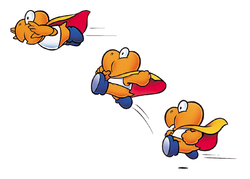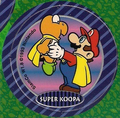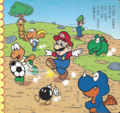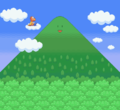Super Koopa (enemy)
| Super Koopa | |||
|---|---|---|---|
 Artwork of a Super Koopa taking off in Super Mario World | |||
| First appearance | Super Mario World (1990) | ||
| Latest appearance | WarioWare: D.I.Y. Showcase (2009) | ||
| Variant of | Unshelled Koopa Troopa | ||
| |||
Super Koopas, also known as Super Koopa Troopas,[1] are unshelled Koopas that wear capes, allowing them to fly. They are found in Super Mario World, where they appear in Donut Plains 1, Butter Bridge 2, and Funky. They can be defeated by all attacks.
There are four types of Super Koopas:
- Red shoes with yellow capes: They swoop down when Mario or Luigi approaches, and then rise back up.
- Green shoes with red capes: They have the same behavior as above, but they are randomly generated enemies. They can also be summoned by two whistling Chargin' Chucks in Funky.
- Blue shoes with yellow capes: They start on the ground, but they take off and fly continuously forward.
- Blue shoes with flashing capes: Same as above, but stomping on one separates it from a Cape Feather, reverting it to a normal unshelled Koopa. Otherwise, all other attacks instantly defeat the Super Koopas without providing the feather.
In Super Mario World: Super Mario Advance 2, a cutscene shown after the player completes all 96 exits shows Super Koopas with green shoes and yellow capes.
Super Koopas make a cameo in WarioWare: D.I.Y. Showcase in the microgame Super Koopa, where they are based on their Super Mario World appearance. In the microgame, Caped Mario must dodge the aerodynamic enemies and collect some coins.
Profiles and statistics
Super Mario World
- Instruction booklets:
- Japanese: マジックマントを身につけた、空飛ふカメ。マントマリオは激しい空中戦になりそうだ。点滅するマントを着ているやつを踏むと、マント羽根がもらえるよ。(A flying turtle wearing a Magic Cape. Caped Mario is going to be in an intense aerial battle. If you step on one wearing a flashing cape, you'll get a Cape Feather.)
- English: A Koopa that can fly once it has put on a magic cape. It looks like this guy might give Caped Mario some tough aerial combat. But look at the bright side ... if you jump on one that's wearing a flashing cape, you'll get a Cape Feather.[2]
Perfect Ban Mario Character Daijiten
Gallery
Artwork
Mario holding a Super Koopa
Super Mario World Donut Plains artwork
Artwork used for a Super Mario puzzle
Super Mario Maze Picture Book 5: Adventure in the Land of Rainbows
Sprites
Screenshots
Miscellanous
Mario Undōkai trading card
Eight of Hearts Mario Playing Cards
Names in other languages
| Language | Name | Meaning | Notes |
|---|---|---|---|
| Japanese | マントガメ[3][page number needed] Mantogame |
From "mantle" and compounded version of「亀」 (kame, "turtle"); officially romanized as “Manto Game” | |
| Chinese (simplified) | 斗篷喏库[5] Dǒupéng Nuòkù |
Mantle Koopa (Nuòkùnuòkù is the Chinese name for Koopa Troopas) | |
| Chinese (traditional) | 披風龜[6] Pīfēng Guī |
From 「披風」 (pīfēng, "mantle") and 「慢慢龜」 (Mànmànguī, "Koopa Troopa") | |
| German | Super Koopa[?] | - | |
| Italian | Super Koopa[4] | - | |
| Portuguese | Super Koopa[?] | - | |
| Spanish | Super Koopa[?] | - |
Trivia
- During development of Super Mario Kart, one of the alternate victory screens featured a Super Koopa flying by and getting knocked over by the champagne bottle cork, but this was removed in the final version.[1]
References
- ^ a b "Instead of the giant Cheep Cheep dropping the trophy on your head, in unreleased versions of the game there was a time when securing 2nd place would cause a Super Koopa Troopa to fly by and get hit by the champagne cork. Placing 3rd would result in four flying Koopa Troopas passing overhead, with the last one getting hit by the cork as well." – Playing With Super Power: Nintendo Super NES Classics eGuide, Super Mario Kart 16 Bits Tab. Prima Games.
- ^ Nintendo (1991). Super Mario World instruction booklet. Nintendo of America (American English). Page 23.
- ^ Super Mario World Japanese instruction booklet, characters section.
- ^ Super Mario World Italian instruction booklet, characters section
- ^ 无敌阿尔宙斯 (August 28, 2013). 神游 超级马力欧世界 敌人官译]. Baidu Tieba (Simplified Chinese). Retrieved February 2, 2017.
- ^ 開發人員的訪談 : 超級瑪利歐兄弟 驚奇|任天堂. Nintendo (Traditional Chinese). Retrieved October 20, 2023.



















